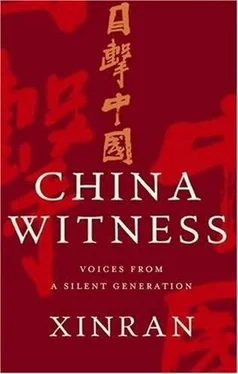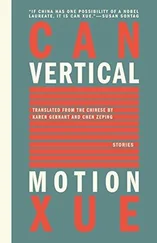"Xinran," she had said to me, in her usual forthright tones, months earlier, "I definitely want to be in your book. I want to make my granddaughter Shanshan understand my past, my feelings, my political ideals. I want her to realise that her generation has something in common with mine."
But now, as we spoke on the phone, she told me that the more she thought about speaking out, the more distressed she felt. She hated herself, she said: the beauty she had lost, the fact that she had never enjoyed a warm, close family life, that even now, past eighty, she felt inhibited, controlled by her husband; that she was still not free. Her only truly happy moments, she told me, were strolling on her own around Beihai Park in Beijing.
"Don't be angry with me," she said, after begging me to let her withdraw. She seemed a different person from the woman who had enthused so excitedly about the project in the past. But after putting the phone down, I knew she was the same Jin Zhi as ever; and that, in her way, she was representative of millions of Chinese. For the last hundred years, the Chinese people have been hesitating between affirmation and denial of the self; her inner struggle was entirely typical. Very few people can understand and define themselves as individuals, because all their descriptive vocabulary has been colonised by unified social and political structures. A person can readily respond to external stimuli – to political injustice, to frustrations at work, to the praise of others – but only rarely succeed in making independent sense of themselves.
I thought again of my mother-in-law, who had often been criticised for her individualism. If Mary Wesley had concentrated exclusively on rebelling against convention, on showing other women how they could dare to be different, without writing her novels, would she still be remembered? Might she have faded from view, like so many millions of forgotten old people? Mary had never been willing to be ordinary; she knew better than anything else how to be an individual.
Digging deep into her own life experiences, Mary, who was seventy when her first novel was published, used her writing – a testament to her own determination to swim against the tide – to challenge social and sexual mores. Through her own frankness and self-reflection, she encouraged her readers to re-evaluate themselves. Many older people who have come to hear me speak at bookshops and festivals have told me that reading her books made them feel constricted by their hidebound lives, desperate to rebel, though too timid to do so. But reading the biography – about Mary's self-confidence and wild independence – inspired them.
If these testimonies to the dignity of modern Chinese lives succeed in making some members of China's older generations feel that their lives have not been wasted, and in persuading younger generations that the dazzling landscapes and possibilities of contemporary China have been realised only through the sacrifices and struggles of their forebears, I will feel that I have achieved something for my son and future grandchildren. If we let these old people take their experiences with them to the grave, I feel that we are doing them a serious injustice. They all have stories to tell; and even if these stories strike us as ignorant, foolish, perhaps criminal, they will usefully force us to reflect on progress we have subsequently made.
I realised, that morning in June, I had lost all confidence in myself. I was feeling overwhelmed by the complexities of the lives I had decided to explore – their childhood pleasures, their hopes and ambitions, their loves, friendships, attachments. Had they found happiness? Contentment? How would I begin my interviews? Where would they end?
Planning this journey took me six months; not only was it very difficult to line up interviews but also to structure a "time line" for readers to see the difference between the historical China and today's image of China. From my research, I discovered that it sometimes took more than twenty years for the poorest and westernmost regions of the country to receive the policies and orders from central government departments which were mostly located in the eastern part of China. Improvements in modern living conditions often took as long. For instance, the Single Child policy was initiated in 1979 (it finally became a law in 2004) but many families have large numbers of children in southern and western China, even in the villages near big cities. Therefore, I chose to move between the Yellow River and the Yangtse, the most populated area of China, from west to east, so that readers could follow our journey to see what Chinese lives looked like from the 1980s to 2006.
The witnesses in this book lived in the period that is known to the West as the "Time of Red China", but most Chinese call it the "Time of the Leadership of the Party". For this reason, in this book (which is neither a work of historical research, nor one that comes up to strict academic standards), whether I talk in terms of Red China or of the leadership of the Party, it is necessary for me to tell some of the stories from the history of the Communist Party as plainly, readably and simply as I can. That way, readers, most of whom know nothing of the history of the Chinese Communist Party, will be able to find answers to some of the questions of today's China.
In my search for a witness close to the upper echelons of the Communist Party, I considered several dozens of possible interviewees: I was looking for an eyewitness who has survived the political chaos of China's modern history and come out the other side. This is why I chose Fang Haijun, a victim of a high-level conflict in 1931, the first head of Mao Zedong's personal guard, a man personally selected by Mao in 1938 to be Chief of the Organisation Committee of the Political Office of the Central Military Commission, and a former deputy chairman of the General Party Affairs Office (a body made up of twenty-six high-ranking military leaders, which included such historical figures as Zhu De, Peng Dehuai, Lin Biao, Chen Yi and Liu Bocheng). He was also one of the people who created China's national defence industry after 1949, as well as the founder of China's Naval Academy and submarine fleet. However, his "closeness to history" in the end proved an obstacle, not an opportunity. His story alone requires a book, but our conversation helped me to understand the rules that govern China's political life. When I asked him how he was able to survive the fierce infighting of Mao's inner circle, he told me the following story. In the 1930s, he often played mah-jong with Mao Zedong, Tan Zheng and a few other fellow Hunanese. There are many different systems for mahjong, but people from the same place play according to the same rules: they did not need to spend a lot of time talking about it, they all understood the strategies, because they had all been raised in the earth and water of the same place. His words were often in my mind as I prepared for the interviews before me.
When choosing accommodation for our research team, I decided that in poorer areas, we would try to stay in the best government guest houses; in more developed cities, we would look for the cheapest single-star hotels.
My first consideration in impoverished parts of China was security. Officials in poor areas are for the most part not very educated – particularly with respect to legal freedoms and human rights – and tend to respect only government-run institutions. I thought that if we stayed in the most expensive establishment in the area, the local officials would be too intimidated to interfere with us. In more prosperous parts of the country, I wanted the team to experience as much of ordinary, daily life as they could: to take the everyday temperature of the area through the food that they ate and places they stayed. Through noting local differences, I hoped we would see at first hand the historical fault lines in China's development: the small towns lagging ten, twenty, even thirty years behind the big showcase cities.
Читать дальше












